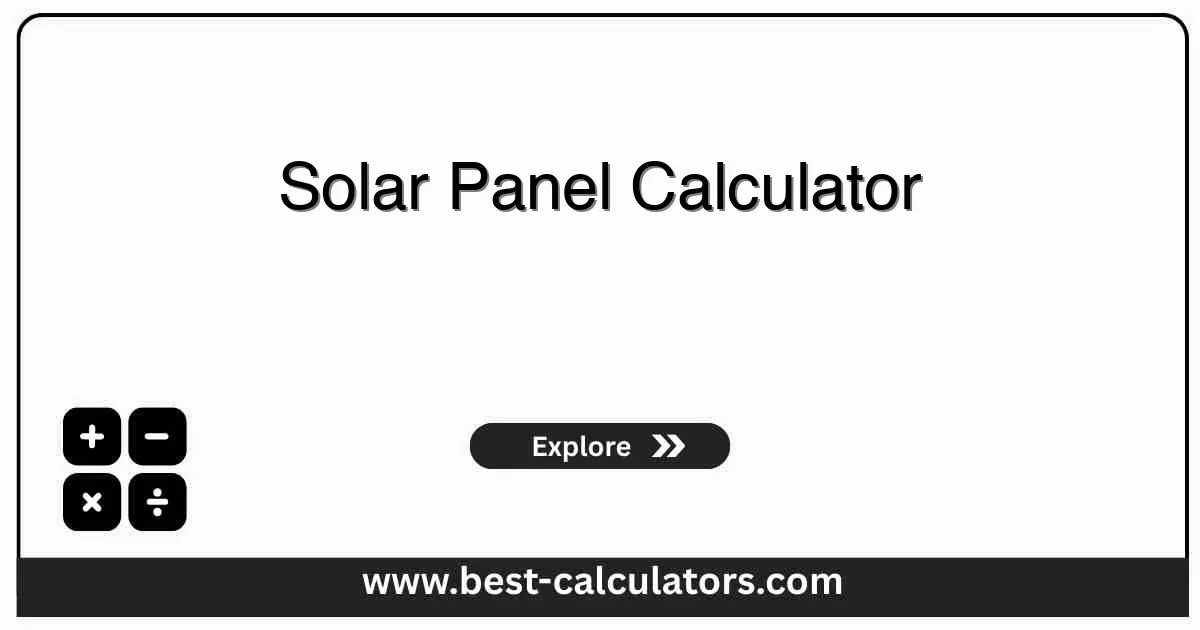Solar Panel Calculator - Estimate Installation Costs & Savings
Free solar panel calculator to determine the number of panels needed for your home, estimate energy production, and calculate potential cost savings based on your energy usage and location
Solar Panel Calculator
Results
What is a Solar Panel Calculator?
A solar panel calculator is a free construction tool that helps homeowners estimate the number of solar panels needed for their home, calculate potential energy production, and determine cost savings from solar installation.
For comprehensive home improvement planning, you might also need our Roof Truss Calculator for roof structural requirements, Window & Door Calculator for energy efficiency improvements, or Snow Load Calculator for roof loading considerations.
This calculator helps with:
- System sizing - Determine the right solar system size for your energy needs
- Cost estimation - Calculate upfront costs and potential savings
- Financial planning - Estimate return on investment and payback period
- Energy independence - Plan for reduced reliance on the grid
- Environmental impact - Estimate carbon footprint reduction
Benefits of Solar Energy
Installing solar panels offers numerous benefits for homeowners:
Financial Savings
Reduce or eliminate electricity bills and protect against rising energy costs.
Environmental Impact
Reduce carbon footprint and dependence on fossil fuels for clean energy.
Home Value
Increase property value with energy-efficient improvements.
Energy Independence
Generate your own electricity and reduce reliance on the grid.
Types of Solar Panels
Monocrystalline
Most efficient panels (15-22% efficiency) made from single silicon crystals. More expensive but require less space.
Polycrystalline
Less expensive panels (13-16% efficiency) made from multiple silicon fragments. Good balance of cost and efficiency.
Thin-Film
Flexible, lightweight panels (10-12% efficiency) that work better in high temperatures but require more space.
How to Use This Solar Panel Calculator
Enter Monthly Usage
Input your average monthly electricity consumption in kilowatt-hours (kWh)
Set Peak Sun Hours
Enter the average daily peak sun hours for your location
Select Panel Wattage
Choose the wattage of solar panels you plan to install
Enter System Cost
Input the total cost of your solar installation
Set Electricity Rate
Enter your current electricity rate per kilowatt-hour
Get Results
View system size, panels needed, and financial savings
Benefits of Using Solar Panel Calculator
- • Accurate Planning: Determine the right system size for your energy needs.
- • Cost Estimation: Calculate upfront costs and potential savings.
- • Financial Analysis: Estimate return on investment and payback period.
- • Contractor Quotes: Compare quotes from different solar installers.
- • Incentive Planning: Factor in tax credits and rebates for better financial planning.
Factors That Affect Your Solar Installation
1. Roof Condition
Roof age, orientation, and shading significantly impact solar panel performance and installation costs.
2. Local Incentives
Federal tax credits, state rebates, and utility incentives can significantly reduce system costs.
3. Energy Usage Patterns
Your electricity consumption patterns affect the optimal system size and configuration.
4. Installation Complexity
Roof type, accessibility, and electrical infrastructure affect installation time and costs.

Frequently Asked Questions (FAQ)
Q: How do I calculate my home's solar energy needs?
A: Review your past 12 months of electricity bills to determine your average monthly kWh usage. Multiply this by the number of peak sun hours in your area to estimate the solar system size you'll need.
Q: What factors affect solar panel efficiency?
A: Panel orientation and tilt, shading, temperature, panel quality and age, and local weather conditions all affect solar panel efficiency.
Q: How much roof space do I need for solar panels?
A: A typical solar panel requires about 15-20 square feet of space. For a 5kW system (15-20 panels), you'll need approximately 300-400 square feet of unshaded roof space.
Q: What is the payback period for solar panels?
A: The payback period typically ranges from 6-10 years, depending on your location, electricity rates, system cost, and available incentives.
Q: How long do solar panels last?
A: Most solar panels come with 20-25 year warranties and can continue producing electricity for 30-40 years with minimal degradation.
Q: Do solar panels work on cloudy days?
A: Yes, solar panels can still generate electricity on cloudy days, though production will be reduced by 10-25% compared to sunny days.